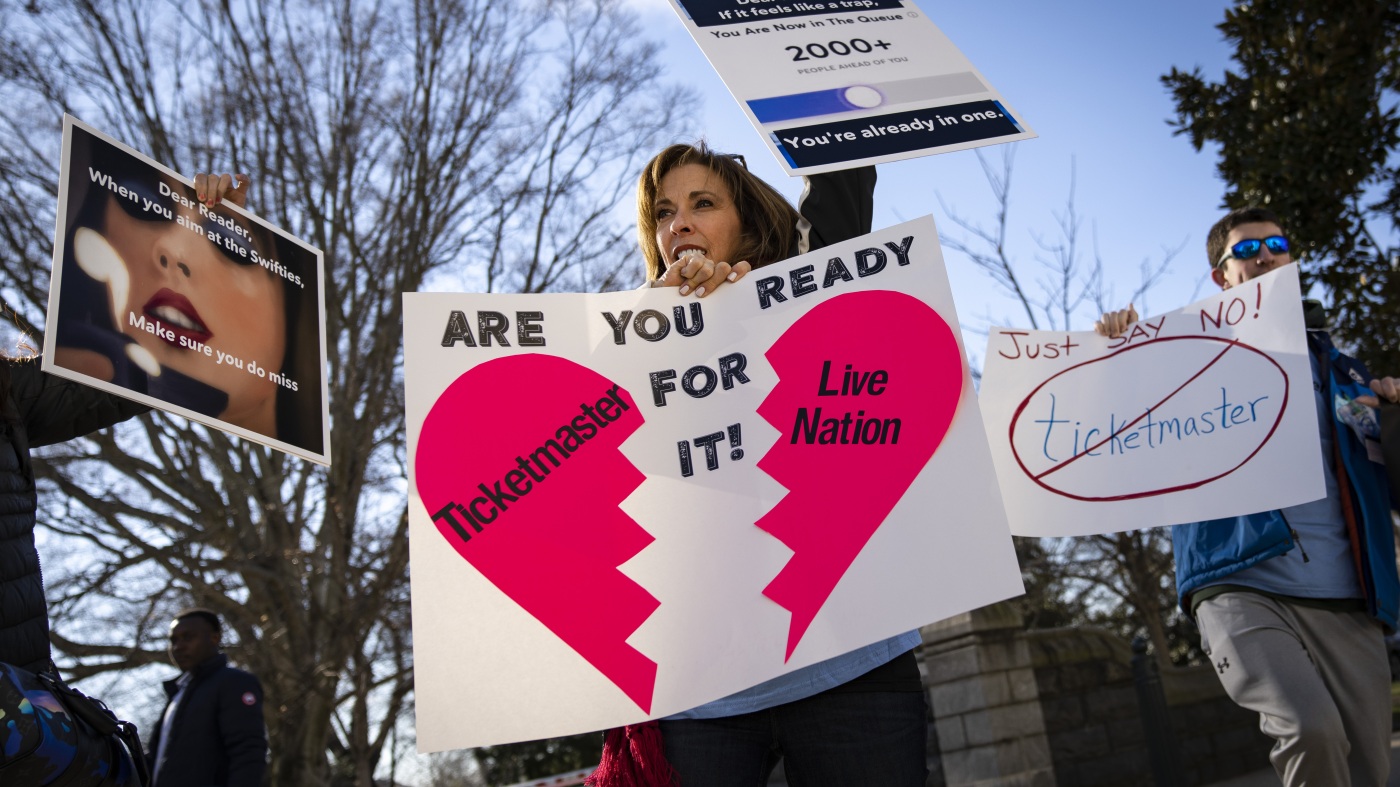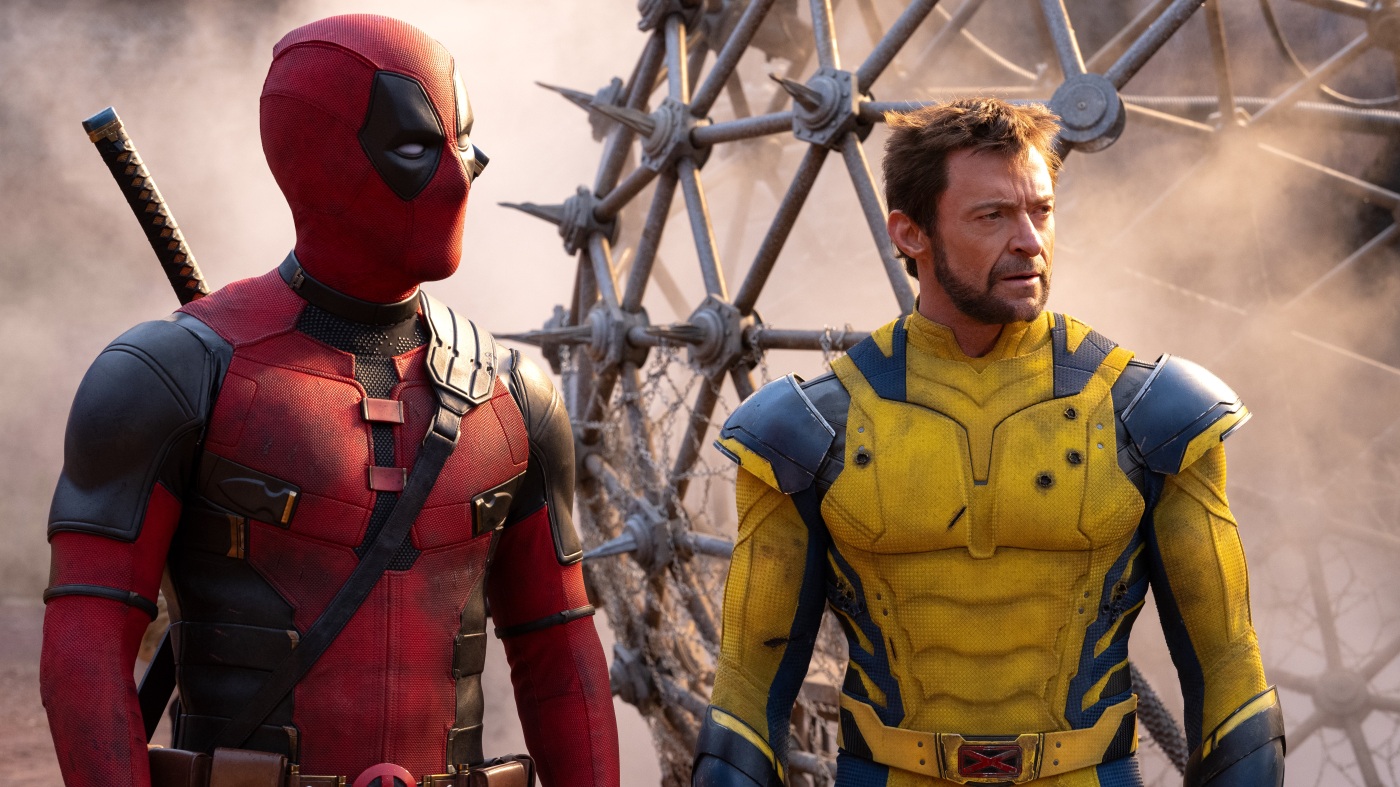Lifestyle
‘It is time to break up Live Nation-Ticketmaster’: Justice Department sues concert ticket behemoth

Penny Harrison and her son Parker Harrison rally against the live entertainment ticket industry outside the U.S. Capitol last year.
Drew Angerer/Getty Images/Getty Images North America
hide caption
toggle caption
Drew Angerer/Getty Images/Getty Images North America
The Department of Justice and 30 state and district attorneys general across the country filed a federal lawsuit Thursday against Live Nation Entertainment and its wholly owned subsidiary Ticketmaster. The suit alleges that Live Nation has created a monopoly on live event ticket prices across the United States. The civil antitrust suit was filed in the Southern District of New York.
This fight has been long in coming: Music fans and other consumers, performers, independent venues and even members of Congress have argued that Ticketmaster, which merged with Live Nation in 2010, had artificially pushed ticket prices sky-high. Live Nation has long been a dominant player in the live event marketplace, with substantial holdings in venues, concert promotions, music festivals, ticketing, sponsorship, advertising and artist management – holding so much power across so many aspects of the business, the Justice Department alleges, that it is effectively able to limit its competition.
If successful, this suit could reshape the live event landscape – and the prices fans pay to see their favorite performers – across the country.
The state and district attorneys general joining the suit include several states that are home to major live event venues, including those of New York, California, Colorado, Florida and Texas.
In a lengthy statement provided to NPR on Thursday, Live Nation wrote in part: “The DOJ’s lawsuit won’t solve the issues fans care about relating to ticket prices, service fees, and access to in-demand shows. Calling Ticketmaster a monopoly may be a PR win for the DOJ in the short term, but it will lose in court because it ignores the basic economics of live entertainment, such as the fact that the bulk of service fees got to venues, and that competition has steadily eroded Ticketmaster’s market share and profit margin.”
Within the suit, the Department of Justice and the states allege that Live Nation and Ticketmaster engaged in several forms of anticompetitive conduct, including retaliating against other promotion companies and venues that worked with its rivals; locking out competitors with long-term, exclusive ticketing contracts; restricting musicians’ access to live event venues; and strategically acquiring smaller, independent companies that Live Nation allegedly perceived as threats to its dominance.
Earlier this month, in a bid to increase transparency for consumers, the House of Representatives passed the TICKET Act, which would force Live Nation and other ticket sellers to list all the costs and fees within a live event ticket price. The bill, which was introduced in the Senate by Ted Cruz of Texas, has been supported by hundreds of prominent musicians, including Billie Eilish, Dave Matthews and Nile Rodgers, who wrote in a joint statement: “We are joining together to say that the current system is broken: predatory resellers and secondary platforms engage in deceptive ticketing practices to inflate ticket prices and deprive fans of the chance to see their favorite artists at a fair price.”
According to Thursday’s filing, Live Nation Entertainment currently owns or controls over 250 concert venues across North America, and controls around 60 percent of concert promotions at major concert venues across the U.S. The company also directly manages more than 400 musical acts.
In the suit, the Department of Justice and the states asserted: “With this vast scope of power comes influence. Live Nation and its wholly owned subsidiary, Ticketmaster, have used that power and influence to insert themselves at the center and the edges of virtually every aspect of the live music ecosystem.”
“It is time to break up Live Nation-Ticketmaster,” said Attorney General Merrick Garland in a statement.
In the past, and again in its statement to NPR on Thursday, Live Nation argued that musicians — not its own company — are the ones to ultimately set their own ticket prices. Live Nation executive vice president of corporate and regulatory affairs Dan Wall said that the suit “ignores everything that is actually responsible for higher ticket prices, from increasing production costs to artist popularity, to 24/7 online ticket scalping that reveals the public’s willingness to pay far more than [what] primary tickets cost.”
“It is not surprising that Live Nation has pointed its finger at artists,” a senior Justice official said on background on Thursday morning. “In an industry in which artists have historically been squeezed for compensation for their creative work, it’s important that artists are properly compensated.”
“To us, that’s a little bit of a red herring,” the official continued, referring to Live Nation’s previous argument. “How is the system set up? How is Live Nation’s control at all levels of the system allowing for a process that’s distorted in part by Live Nation’s power?”
The DOJ is pressing for “structural relief” – that is, it is asking the federal court to break up the Live Nation-Ticketmaster combined company, which the DOJ itself had approved in the 2010 merger. Justice Department officials are now arguing that since the merger, Live Nation has created a stranglehold on the live event industry.
Thursday’s case is the latest lawsuit by the Biden administration against major corporations that it has accused of abusing monopoly power. The Justice Department and the Federal Trade Commission have sued Apple, Google and Amazon. They’ve successfully stopped the mergers of publishers Penguin Random House and Simon & Schuster and of JetBlue Airways with Spirit Airlines. They’ve also unraveled a partnership between JetBlue and American Airlines.
Last year, however, federal officials lost their bids to block the merger of Microsoft and videogame giant Activision Blizzard; of Facebook parent Meta with virtual-reality company Within Unlimited; and of insurer UnitedHealth Group with tech firm Change Healthcare.
“While we do not comment on specific enforcement matters, President Biden strongly supports fair and robust enforcement of the antitrust laws,” said White House Press Secretary Karine Jean-Pierre in a statement Thursday. “The President launched the Strike Force on Unfair and Illegal Pricing because no American should pay higher prices or lose choices because companies break the law and engage in anti-competitive practices. His Administration has taken action to fight corporate greed by banning hidden junk fees—including event tickets—that unfairly increase prices for hardworking families trying to make ends meet. As the President has said, the American people are tired of being played for suckers.”
The announcement of the federal antitrust suit against Live Nation is just a first step in what will almost certainly be a long court process, so music fans likely won’t encounter lower ticket prices any time soon.
With additional reporting by Alina Selyukh.

Lifestyle
'Wait Wait' for July 27, 2024: With Not My Job guest Kathleen Hanna

Kathleen Hanna of The Julie Ruin performs onstage at the 2016 Panorama NYC Festival – Day 2 at Randall’s Island on July 23, 2016 in New York City. (Photo by Nicholas Hunt/Getty Images)
Nicholas Hunt/Getty Images/Getty Images North America
hide caption
toggle caption
Nicholas Hunt/Getty Images/Getty Images North America
This week’s show was recorded in Chicago with host Peter Sagal, judge and scorekeeper Bill Kurtis, Not My Job guest Kathleen Hanna and panelists Meredith Scardino, Peter Grosz, and Mo Rocca Click the audio link above to hear the whole show.
Who’s Bill This Time
Momala Takes Over; Assigned Seats Are Back; And The Heat Is On
The Olympic Torch Reporch
Our Summer Olympics Preview
Bluff The Listener
Our panelists tell three stories about someone committing an office faux pas, only one of which is true.
Not My Job: We quiz Bikini Kill’s Kathleen Hanna on Hanna-Barbera
Punk icon Kathleen Hanna plays our game called, “Kathleen Hanna Meet Hannah-Barbera.” Three questions about the animation studio.
Panel Questions
Hide Your Receipts; VR Meets ER; Avocado Apologies
Limericks
Bill Kurtis reads three news-related limericks: Situation Room Cocktails; Burrito Bird; Hopped Up Sharks
Lightning Fill In The Blank
All the news we couldn’t fit anywhere else
Predictions
Our panelists predict what will be the big story out of the Paris Olympic Games
Lifestyle
L.A. Affairs: At 77, I had a crush on my best friend’s widower. Did he feel the same way?

At 77, I had given up. After two failed marriages and years of unsuccessful dating, I accepted what seemed to be my fate: single for almost 40 years and single for however many remained. You don’t get it all, I told myself. I was grateful for family, friends and work. Life settled into what felt like order.
Until Ty.
As the husband of my best friend, he was no stranger, but he was usually peripheral. Then 10 years ago, my friend got lung cancer. I watched during visits, stunned at how nurturing Ty could be, taking care of her even though they had separated years before at her request.
After she died, Ty and I stayed in touch sporadically: a surprise sharing of his second granddaughter a year after we scattered my friend’s ashes, an invitation to the launch of my book a year later. Ty attended, hovering in the back, emerging after everyone left to attentively help load my car.
Two more years passed. During quiet moments, I remembered his sweetness. I also remembered his handsome face and long, tall body. Confused about what I wanted, I texted Ty, who’s an architect, under the guise of purchasing a tree for my backyard.
We spent an afternoon at the nursery, laughing, comparing options and agreeing on a final selection. When the tree arrived, I emailed a photo. He emailed a thank you.
Another three years passed, broken only by news of his third granddaughter and my memories of how good it felt to be with him. Alert to his attentiveness, but unsettled by both his remove and my growing interest, I risked reaching out again, this time about remodeling my garage.
Ty spent several hours at my house making measurements, checking the foundation and sharing pictures of his home in Topanga. His sketches for the garage arrived two weeks later via email.
I was grateful for his help but unsure over what sort of friendship we were developing, at least from his point of view. I, however, was clear. I wanted him to wrap his long arms around me, tell me sweet things and make me his.
Instead, I sent a gift card to a Topanga restaurant to thank him for his drawings.
“Maybe we should spend it together,” he texted.
We dined in the dusk of late summer. Our talk was easy. Discomfort lay in the unspoken. Anxious for clarity, I repeatedly let my hand linger near the candle flickering in the middle of our table. It remained untouched.
And that was as far as I was willing to go. I refused to be any more forward, having already compromised myself beyond my comfort level with what seemed, at least to me, embarrassingly transparent efforts to indicate my interest. Not making the first move was very important. If a man could not reach out, if he didn’t have the self-confidence to take the first step, he would not, I adamantly felt, be a good partner for me.
Two weeks later, Ty did email, suggesting an early evening hike in Tuna Canyon in Malibu. The setting was perfect. Sun sparkled off the ocean. A gentle breeze blew. We climbed uphill for sweeping coastal vistas and circled down to the shade of live oaks, touching only when he took my hand to steady me where the path was slippery. At the end of the trail, overlooking the juncture between the mountains and the sea, we stood opposite each other and talked animatedly for almost an hour, both of us reluctant to part.
Our conversation was engaging, but my inner dialogue was louder. When, I kept thinking, is this man going to suggest we continue the evening over dinner? We didn’t have to go out. We could eat at his house. It was 7 p.m., for God’s sake. Passing hikers even stopped to remark on our matching white hair and how well they thought we looked together. It was like a movie scene where the audience is yelling, “Kiss her, kiss her,” rooting for what they know is going to happen while the tension becomes almost unbearable. But bear it I did.
Each of us ate alone.
A few weeks later, at his suggestion, we were back at Tuna Canyon. This time Ty did invite me to end the evening at his house. Sitting close on his couch, but not too close, we drifted toward each other in the darkening room. His shoulder brushed mine reaching for his cup of coffee. My hip pressed his as I leaned in for my tea. Slowly, sharing wishes and hopes for our remaining years, we became shadows in the light of the moon. And in that darkness, in that illuminated space, he reached out.
This reticent man, this man who was so slow to move toward me, this sensitive man who hid himself behind layers so opaque I was unsure of his interest, released all that he had inside him.
“I wanted you,” Ty repeated again and again. “I was afraid of ruining things. You were her best friend. I didn’t want to lose your friendship.”
Our pent-up tension exploded.
Stunned and thrilled, I leaned into the space he opened.
Three years later, it is a space we continue to share: a place where neither of us has given up, a place where he wraps me in his long arms, a place we hold carefully against our diminishing days.
The author is the owner of a preschool in Venice as well as a psychotherapist, photographer and writer. Her first book, “Naked in the Woods: My Unexpected Years in a Hippie Commune,” was published in 2015. Her newest manuscript, “Bargains: A Coming of Aging Memoir Told in Tales,” is seeking a publisher. She lives in Mar Vista and can be found at margaretgrundstein.com, Instagram @margwla, Medium @margaretgrundstein and Substack @mgrundstein.
L.A. Affairs chronicles the search for romantic love in all its glorious expressions in the L.A. area, and we want to hear your true story. We pay $400 for a published essay. Email LAAffairs@latimes.com. You can find submission guidelines here. You can find past columns here.
Lifestyle
'Deadpool & Wolverine' is a self-cannibalizing slog

Ryan Reynolds stars as Deadpool and Hugh Jackman as Wolverine in an odd-couple action hero pairing.
Jay Maidment/20th Century Studios
hide caption
toggle caption
Jay Maidment/20th Century Studios
When Fox Studios released the first Deadpool movie back in 2016, it played like an irreverently funny antidote to our collective comic-book-movie fatigue. Wade Wilson, or Deadpool, was a foul-mouthed mercenary who obliterated his enemies and the fourth wall with the same gonzo energy.
Again and again, Deadpool turned to the camera and mocked the clichés of the superhero movie with such deadpan wit, you almost forgot you were watching a superhero movie. And Ryan Reynolds, Hollywood’s snarkiest leading man, might have been engineered in a lab to play this vulgar vigilante. I liked the movie well enough, though one was plenty; by the time Deadpool 2 rolled around in 2018, all that self-aware humor had started to seem awfully self-satisfied.
Now we have a third movie, Deadpool & Wolverine, which came about through some recent movie-industry machinations. When Disney bought Fox a few years ago, Deadpool, along with other mutant characters from the X-Men series, officially joined the franchise juggernaut known as the Marvel Cinematic Universe.
That puts the new movie in an almost interesting bind. It tries to poke fun at its tortured corporate parentage; one of the first things Deadpool says is “Marvel’s so stupid.” But now the movie also has to fit into the narrative parameters of the MCU. It tries to have it both ways: brand extension disguised as a satire of brand extension.

It’s also an odd-couple comedy, pairing Deadpool with the most famous of the X-Men: Logan, or Wolverine, the mutant with the unbreakable bones and the retractable metal claws, played as ever by a bulked-up Hugh Jackman.
The combo makes sense, and not just because both characters are Canadian. In earlier movies, Deadpool often made Wolverine the off-screen butt of his jokes. Both Deadpool and Wolverine are essentially immortal, their bodies capable of self-regenerating after being wounded. Both are tormented by past failures and are trying to redeem themselves. Onscreen, the two have a good, thorny chemistry, with Jackman’s brooding silences contrasting nicely with Reynolds’ mile-a-minute delivery.
I could tell you more about the story, but only at the risk of incurring the wrath of studio publicists who have asked critics not to discuss the plot or the movie’s many, many cameos. Let’s just say that the director Shawn Levy and his army of screenwriters bring the two leads together through various rifts in the multiverse. Yes, the multiverse, that ever-elastic comic-book conceit, with numerous Deadpools and Wolverines from various alternate realities popping up along the way.

I suppose it’s safe to mention that Matthew Macfadyen, lately of Succession, plays some kind of sinister multiverse bureaucrat, while Emma Corrin, of The Crown, plays a nasty villain in exile. It’s all thin, derivative stuff, and the script’s various wink-wink nods to other shows and movies, from Back to the Future to Furiosa to The Great British Bake Off, don’t make it feel much fresher. And Levy, who previously directed Reynolds in the sci-fi comedies Free Guy and The Adam Project, doesn’t have much feel for the splattery violence that is a staple of the Deadpool movies. There’s more tedium than excitement in the characters’ bone-crunching, crotch-stabbing killing sprees, complete with corn-syrupy geysers of blood.

For all its carnage, its strenuous meta-humor and an R-rated sensibility that tests the generally PG-13 confines of the MCU, Deadpool & Wolverine does strive for sincerity at times. Some of its cameos and plot turns are clearly designed to pay tribute to Fox’s X-Men films from the early 2000s.
As a longtime X-Men fan myself, I’m not entirely immune to the charms of this approach; there’s one casting choice, in particular, that made me smile, almost in spite of myself. It’s not enough to make the movie feel like less of a self-cannibalizing slog, though I suspect that many in the audience, who live for this kind of glib fan service, won’t mind. Say what you will about Marvel — I certainly have — but it isn’t nearly as stupid as Deadpool says it is.

-

 World1 week ago
World1 week agoOne dead after car crashes into restaurant in Paris
-

 Midwest1 week ago
Midwest1 week agoMichigan rep posts video response to Stephen Colbert's joke about his RNC speech: 'Touché'
-

 News1 week ago
News1 week agoVideo: Young Republicans on Why Their Party Isn’t Reaching Gen Z (And What They Can Do About It)
-

 Movie Reviews1 week ago
Movie Reviews1 week agoMovie Review: A new generation drives into the storm in rousing ‘Twisters’
-

 News1 week ago
News1 week agoIn Milwaukee, Black Voters Struggle to Find a Home With Either Party
-

 Politics1 week ago
Politics1 week agoFox News Politics: The Call is Coming from Inside the House
-

 News1 week ago
News1 week agoVideo: J.D. Vance Accepts Vice-Presidential Nomination
-

 World1 week ago
World1 week agoTrump to take RNC stage for first speech since assassination attempt
















